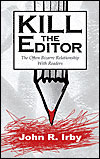book
Kill the Editor
by John Irby, clinical associate professor, communications :: Millennial Mind Publishing :: Reviewed by Rob Dennie '05

A job warranting more assassination attempts than the president of the United States exists in cities around the world.
The job? Editing a newspaper.
John R. Irby, a WSU clinical associate professor of communication, wrote a new book, Kill the Editor: The Often Bizarre Relationship with Readers, that chronicles 25 years of newspaper experience from the editor's chair.
Irby collected personal stories and letters from readers for the bulk of the book's material. The book highlights the emotions of all humans from a perspective the public never experiences: That of a professional journalist.
Leticia Gomez, editor for American Book Publishing, Irby's publisher, said the book offers a firsthand glimpse into the minds of newspaper readers.
"Kill the Editor is equivalent to taking an advanced course in psychology," Gomez said. "Any person desiring to understand the human psyche a little better should read this book. John's idea of compiling 25 years worth of soul-stirring letters written by people from all walks of life and turning it into a book is brilliant."
Teaching has afforded Irby the opportunity to examine the newspaper business. Irby explained how a lack of time prevents reflection while working for a paper.
"When you're in the newspaper industry you don't really have the time to reflect on what you're doing right and what you're doing well," Irby said. "I've had more time to reflect on the industry, some of the problems . . . . It doesn't mean that I'm not a strong defender and supporter of the media and newspapers, but I do look at it a little differently."
One problem Irby noted is the converging of different types of media by large media companies.
In the first chapter of the book, Irby highlights the problem by writing, "And in the process of decline, voices across America are being muted and homogenized by corporate giants who have traded, merged and sold properties—all for bottom-line considerations." Irby stresses the importance of having more voices in the public arena for the betterment of society.
Irby explained how the public can take a stand against the deep pockets of media moguls.
"I think one way is the public can solve it by paying attention to those independent voices and demanding them," Irby said. "If the public says, 'we don't want this homogenized voice,' then maybe it will change."
Irby's influence extends beyond his teaching and books. He developed his leadership skills in the newsroom.
Michael Trihey, assignment manager for KGET-TV in Bakersfield, California, used to work with Irby.
Trihey explained how Irby encouraged his co-workers.
"Irby was one of those great city editors who believed in his reporters and always found a way to push them to be their best. Anytime I found myself trying to take a shortcut or do less than my best on a story, he'd be all over me. He found the perfect combination of carrot and stick. He could nurture you to improve when that was needed, and threaten to 'take you to the woodshed' when that was appropriate."
Although he cautions "never say never," Irby enjoys teaching too much to consider going back to the newspaper business. His presence on campus is appreciated by many, including Alex Tan, director of the Edward R. Murrow School of Communication at WSU.
Tan wrote about Irby's influence regarding the journalism program.
"John Irby is a major reason for the excellent reputation of the Murrow School's print journalism program. He is well respected by professional journalists and academics, and brings a lot of energy and creativity to the program."
Irby wanted a change from the newspaper routine and ad mits having more fun teaching and writing books. He encourages students with the advice to find something they enjoy and not worry about money.
Kill the Editor is a small slice of the knowledge and experience Irby possesses. He explained journalists going into the field should have an understanding of the traditions and business aspects of the industry. Irby also challenged future writers.
"Don't be afraid to be creative, take chances, and challenge those traditions of the newspaper. The definition of news is changing daily."